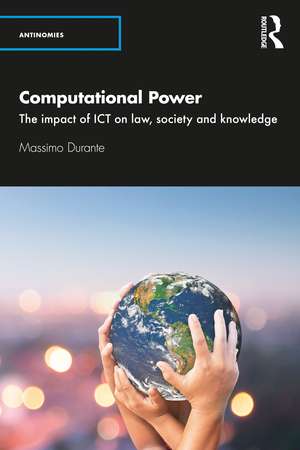Computational Power: The Impact of ICT on Law, Society and Knowledge: Antinomies
Autor Massimo Duranteen Limba Engleză Paperback – 12 mar 2021
It is therefore that much more profound, unnoticed and widespread, for it affects our customary habits and routines and alters the very texture of our day-to-day lives. This opens a precise line of inquiry, which constitutes the basic thesis of the present text: our computational power is exercised by trying to adapt not just the world but also our representation of reality to how computationally based ICTs work. The impact of this technology is such that it does not leave things as they are: it changes the nature of agents, habits, objects and institutions and hence it subverts the existing order, without necessarily generating a new one.
I argue that this power is often not distributed in an egalitarian manner but, on the contrary, is likely to result in concentrations of wealth, in dominant positions or in unjust competitive advantages. This opens up a struggle, with respect to which the task of reaffirming the fundamental values, the guiding principles, the priorities and the rules of the game, which can transform, or attempt to transform, a fierce confrontation between enemies in a fair competition between opponents rests on us.
| Toate formatele și edițiile | Preț | Express |
|---|---|---|
| Paperback (1) | 241.94 lei 3-5 săpt. | +3.09 lei 6-12 zile |
| Taylor & Francis – 12 mar 2021 | 241.94 lei 3-5 săpt. | +3.09 lei 6-12 zile |
| Hardback (1) | 652.84 lei 6-8 săpt. | |
| Taylor & Francis – 12 mar 2021 | 652.84 lei 6-8 săpt. |
Preț: 241.94 lei
Nou
Puncte Express: 363
Preț estimativ în valută:
46.30€ • 49.51$ • 38.60£
46.30€ • 49.51$ • 38.60£
Carte disponibilă
Livrare economică 27 martie-10 aprilie
Livrare express 12-18 martie pentru 13.08 lei
Preluare comenzi: 021 569.72.76
Specificații
ISBN-13: 9780367566241
ISBN-10: 0367566249
Pagini: 194
Dimensiuni: 156 x 234 x 20 mm
Greutate: 0.08 kg
Ediția:1
Editura: Taylor & Francis
Colecția Routledge
Seria Antinomies
Locul publicării:Oxford, United Kingdom
ISBN-10: 0367566249
Pagini: 194
Dimensiuni: 156 x 234 x 20 mm
Greutate: 0.08 kg
Ediția:1
Editura: Taylor & Francis
Colecția Routledge
Seria Antinomies
Locul publicării:Oxford, United Kingdom
Public țintă
Postgraduate, Undergraduate Advanced, and Undergraduate CoreCuprins
Introduction. Computational power 1. The information revolution 2. Technology: From instrument to environment 3. Artificial and human intelligence 4. Memory and oblivion 5. Data, information and knowledge 6. Truth and fake news 7. The governance of algorithms 8. The asymmetric distribution of data and rights 9. Exit, voice and loyalty Conclusion. The shelf of the world
Notă biografică
Massimo Durante is Professor in Philosophy of Law and Legal Informatics at the Department of Law, University of Turin, Italy. He is coordinator of the Turin Unit of Research for the Law, Science and Technology Joint Doctorate: Rights of the Internet of Everything. His current research concerns issues of law and technology and digital governance from a legal, ethical, and epistemological perspective.
Recenzii
"That contemporary social theory and modern European philosophy would turn back to consider its origins in the contradictions of technics and pervasive technology was perhaps predictable; but little could have prepared us for Durante’s remarkable confrontation with the entire philosophical and ontological sweep of the digital revolution."
- Professor Anthony Elliott, University of South Australia
- Professor Anthony Elliott, University of South Australia
Descriere
The impact of technology is such that it does not leave things as they are: it changes the nature of agents, habits, objects and institutions and hence it subverts the existing order, without necessarily generating a new one.










